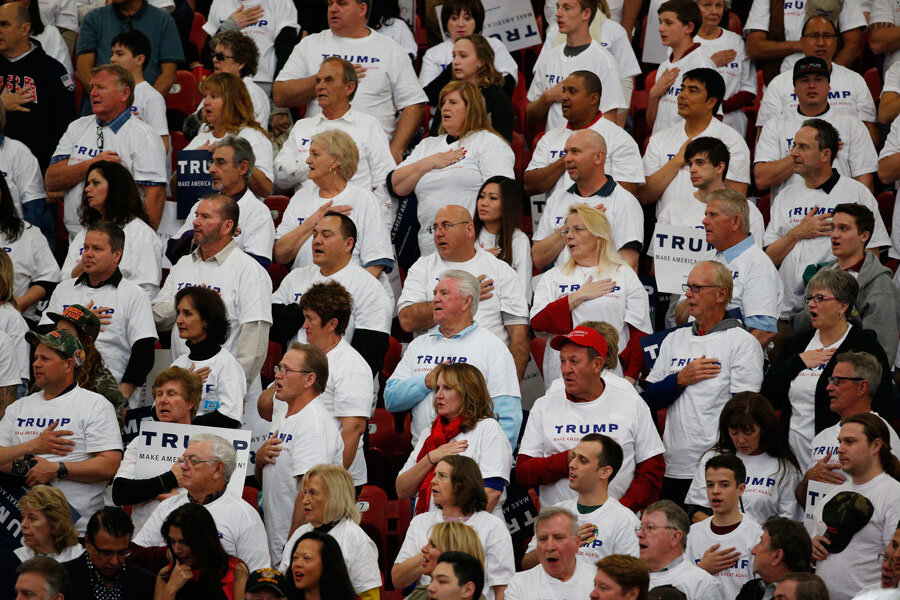Trump's explanation for spreading false info? It's just 'a retweet.'
Loading...
| Las Vegas
Donald Trump has repeated inaccurate and racially charged crime statistics, reposted pledges of support from white supremacists and retweeted dubious questions about the citizenship of his presidential rivals to an online following of more than 6 million people on Twitter alone.
His response when challenged? To dismiss it all as nothing more than harmless "retweets."
Unlike any presidential candidate before him, Trump has fueled his campaign for the Republican nomination with a seemingly endless series of eyebrow-raising statements. It's a strategy unavailable to a conventional politician but seemingly tailor-made for the billionaire businessman, TV celebrity and master marketer.
"We've gone from a 24-hour news cycle to a 24-second news cycle," said GOP consultant Kevin Madden. "So right when you think Trump is about to endure a concentrated level of scrutiny for a false statement or the latest outrage, he is on to the next controversy."
Yet Trump's pattern of repeating things that are false, or just unseemly, and then refusing to take responsibility, would undoubtedly pose a challenge should he move into the White House — where a president's casual utterance or late-night tweet could move financial markets or spark a diplomatic incident.
Trump's latest example came on Saturday, hours before he won the South Carolina GOP primary to cement his status as the Republican presidential front-runner. He quoted a supporter on Twitter who was questioning rival Marco Rubio's eligibility to run for president, even though the Florida senator was born in the U.S.
"It's a SLAM DUNK CASE!! Check it!" read the tweet, which linked to a video on a conservative website featuring an unidentified woman arguing that only people who with American parents qualify as "natural born." Rubio's parents were immigrants from Cuba who didn't become naturalized citizens until a few years after his birth.
Asked about the retweet in an interview on ABC's "This Week" the next day, Trump said he hadn't given the issue much thought.
"Honestly, I've never looked at it," he said. "Somebody said he's not. And I retweeted it. I have 14 million people between Twitter and Facebook and Instagram, and I retweet things and we start dialogue and it's very interesting."
Unabashed, Trump said, "Maybe that's why I have 14 million people" following him and others "have 200 people."
He used the same explanation earlier this month after he retweeted, then promptly deleted, a message from the account of a neo-Nazi, and in November, when he retweeted false crime statistics that dramatically overstated the number of whites killed by blacks.
"Bill, am I gonna check every statistic?" he told Fox News host Bill O'Reilly. "All it was is a retweet. It wasn't from me."
Trump has even taken to using the explanation for comments he makes in person. Asked about his decision to repeat the shouts of a supporter who called Texas Sen. Ted Cruz a "pussy" at a Trump rally the night before New Hampshire's primary, Trump replied: "It was like a retweet. I would never say a word like that."
His rivals aren't impressed.
"This is a game he plays. He says something that's edgy and outrageous, and then the media flocks and covers that and then no one else can get any coverage on anything else," Rubio said this past Sunday on ABC's "This Week."
Trump's brand, built on the premise that he's the tell-it-like-it-is candidate, appears to have inoculated him from the consequences another candidate might face.
"You're talking about conventional wisdom and you're talking about conventional campaign tactics in an unconventional campaign cycle," said Hogan Gidley, who served as a top aide to Mike Huckabee's recently suspended campaign. "Those things just don't matter. They're so small in the big scheme of things that I don't think anything like that is going to catch up to Donald Trump."
As The Christian Science Monitor's Peter Grier writes, outrageous statements are part of Trump's brand, while other candidates are held to a different standard.
His persona is authenticity, strong leadership – and the opposite of political correctness. As Washington Post writer Chris Cillizza put it on Monday, Trump’s “willingness to say anything, no matter the underlying facts, seems to affirm to his supporters just how ‘independent’ of the political system he really is.”
But what if Trump wins the White House? While President Barack Obama is typically careful with his language, some of his more candid moments have underscored the power of a president's every word.
In the closing moments of a 2009 news conference, Obama was asked about the arrest of a black Harvard professor at the professor's home. The president inflamed the debate by saying the police acted "stupidly" — one of Trump's favorite words.
The issue consumed the White House for days, overshadowing Obama's planned agenda and leading the president to host a "beer summit" for the professor and arresting officer.
In 2012, it was a moment of private candor that caused the White House heartburn. During a meeting with then-Russian President Dmitry Medvedev, an open microphone caught Obama saying he would have more "flexibility" on the issue of missile defense after his re-election.
The comment led Republicans to raise questions about what other promises Obama was making for the time when he no longer had to worry about facing voters.
For his part, Trump has repeatedly said he would act differently as president than as a candidate — including on social media.
"If you become president, it has to be toned down a lot. I fully understand that," he said in South Carolina last week. "I'm an intelligent person. I'll tone it down a lot."
___
Associated Press writer Julie Pace contributed to this report from Washington







